

LMU Executive MBA Exchange: Focus on Asia
As we move further into the 21st Century one of the hallmarks of success in business that will become increasingly evident to all is the need of business professionals to continue to develop their professional business skills and to gain increasing understanding of the opportunities and challenges that Asia represents for U.S. business.
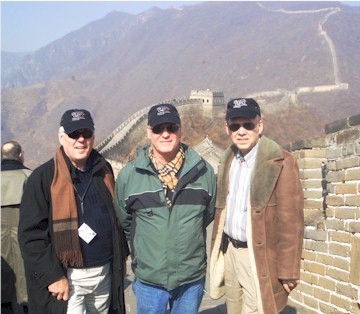 |
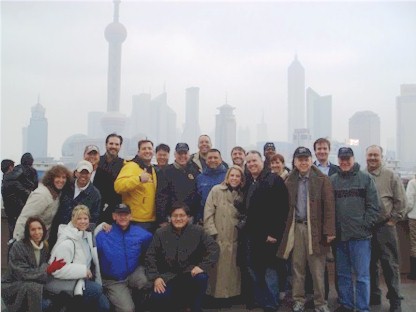 |
||
|
|
In recognition of this new reality in international business, throughout 2005-2006, Runckel & Associates helped Loyola Marymount University (LMU) in Los Angeles, California to visit China and Vietnam and to set up a two-week series of business meetings with leading business executives of major U.S. and other nationality companies involved in Asia. The program was designed to include a full mix of exposure to government officials of both the U.S. and Asian countries plus to be designed to expose EMBA executives to cultural and other aspects of both doing business and in living in Asia.
Loyola Marymount University (LMU) in Los Angeles, California is one of the premier Jesuit universities in the country. Founded in 1911, the University is home to more than 4,700 undergraduates and 1,600 graduate students, and currently enrolls students from 45 states and 150 foreign countries. The university student body is multi-cultural, multi-denominational and multi-ethnic.
The Executive MBA (EMBA) program is in its sixth year at LMU and is considered one of the strongest in the Los Angeles region due to the heavy focus on leadership and its focus on developing graduates skills in generating change in an organization through ethical leadership. The program takes 21 months to complete and begins the same time in August each year and graduates its executives as a group in May. Classes are held two Fridays and Saturdays a month, from 8:00 a.m. to 5:00 p.m. each day. There are four modules (Fall, Spring, Fall, Spring) and a Summer Project in the program. Each module has eight two-day sessions (16 full days per module).
|
|
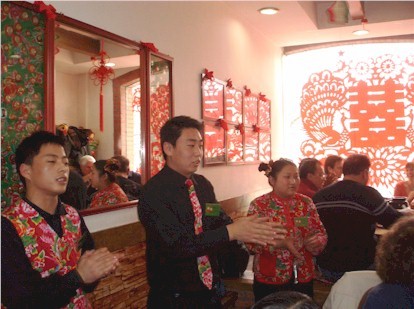 |
||
|
Arriving Shanghai on the weekend gave the students sometimes to get to know the city.
|
..and experience traditional food and unique ambiance. |
||
|
|
|
||
|
|
Recognizing the importance of international business to all companies, the LMU EMBA program has long focused on international business and the opportunities and challenges it represents for business. In the past students visited Europe each year to better reflect on the international aspects of business. In 2005-2006 the focus was changed to Asia and to the many opportunities and challenges that it offers business. In late February and early March, EMBA students visited Shanghai, Beijing and Hanoi, Vietnam to further their exposure to the realities of Asia.
In Shanghai, the group which included 29 executives from companies like Boeing, Honeywell and General Electric (GE) plus from smaller entrepreneurial companies and other organizations, began their visit to China with visits to Suzhou near Shanghai which has become a leading center in China for high-tech industry. The delegation visited Suzhou New & High Tech Development Zone (SND) where senior members of the industrial parks leadership described how industrial parks operate in China and why Suzhou in general and SND in particular offer numerous opportunities for international companies to locate in China.
|
|
|
(above) The group visited several automotive parts factories in Shanghai-Suzhou area
(above) LMU EMBA executives meet with a large U.S. manufacturer in Suzhou which produces flexible circuit boards and does electronic assembly for many large U.S. companies in China and elsewhere
The team then visited three companies – one in the industrial park and two other in a neighboring park and then in the Pu Dong area of Shanghai that helped demonstrate various aspects of multinational investment in China. Although these companies were all major U.S. firms, all three were a contrast in business organization – joint venture vs. Single company ownership, medium size (400 employees) vs. relatively large (10,000 employees), commodities based manufacturing (automotive bearings and fuel systems) vs. high-tech (circuit boards) and with widely different managerial philosophies to help demonstrate the range of business strategies and leadership and other skills employed in China today.
|
|
|
||
|
|
A highlight of the visit to Shanghai was a one and a half hour presentation to the group about the challenges of doing business in China by Kevin Wale, President and CEO of China, for General Motors (GM). Mr. Wale’s excellent presentation, his first to an MBA group since assuming leadership of GM, China, and his adept fielding of questions from the group on all aspects of the automotive industry in China were uniformly praised by the group. Mr. Wale noted that GM has now achieved the leading position in the China auto market through effective partnership with local entities (car production still requires a local partner) but that the market remains extremely competitive and challenging and that to maintain its’ leading position GM China must not rest on its’ laurels or fail to continue its focus on quality, price and all facets of China’s complex auto market. China is now General Motors second largest market worldwide and sales are growing briskly at GM plants in multiple locations in China. Sales of a small urban van are particularly brisk.
|
|
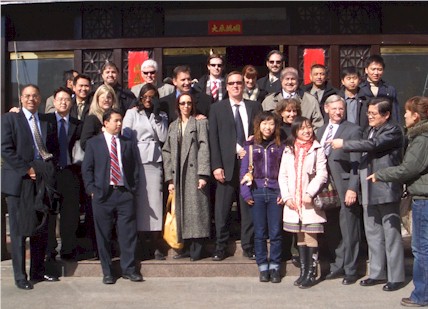 |
||
|
|
||
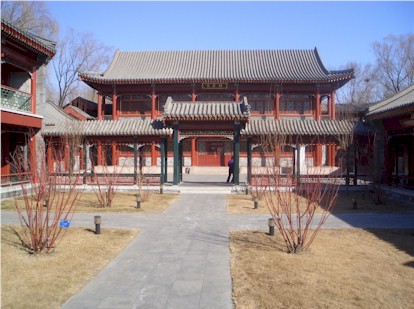 |
|
||
|
|
In Beijing, the executive team participated in a one-day program of lectures at the Jesuit-led Jesuit-supported Beijing Center for Language and Culture at the University of International Business and Economics (UIBE) and at Beijing International Master’s in Business Administration (BIMBA) where they received presentations by the Head of CNN China, a presentation on the cultural challenges ahead for China, a presentation on U.S. business in China by the former Executive Director of the American Chamber of Commerce in Beijing Mike Furst who is now a Professor at BIMBA among other roles plus a stimulating presentation by a senior member of Peking University’s China Center for Economic Research, a major Chinese think tank, Mr. Lu on China’s economy and the challenges and points for concern going forward. A highlight of this program was also a chance to lunch with current MBA students and to discuss their experiences and aspirations as they soon graduate to assume leadership positions in China’s booming industrial development.
|
|
|
|
A visit to Hai Dian, the high-tech industry area of Beijing |
Group picture at the Tiannanmen Square, Beijing |
No visit to China is complete without visits to such sites as the Forbidden City, the Great Wall and also exposure to the cultural complexity that China represents as both an ancient civilization at the same time that the country also is a country of youth and change. China as observed during the trip is a country that still shows signs of considerable poverty at the times that emblems of prosperity and business prowess abound. Observing this cultural component helped greatly to allow the executives to reflect on the complexity of modern day China.
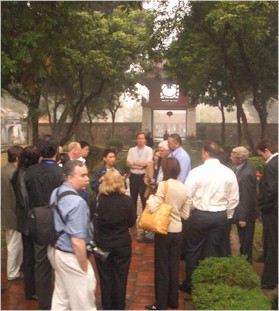 |
Following China, the team moved on to Hanoi, Vietnam where they encountered a much smaller but rapidly developing business environment that has different but just as complex business realities. Vietnam. Like China, is a country of young people with over half of the population born since the end of the war in 1975. |
|
Visiting Van Mieu, Temple of Literature, in Hanoi, Vietnam |
|
|
|
|
(pictures above) A Visit to Ford factory in Binh Duong, Vietnam, the largest U.S. investment in Vietnam
In Hanoi, the executives met with Ford, Vietnam to discuss Ford’s experiences in developing their production facilities in the North. Although relatively small by world standards, Ford’s factory at Binh Duong is the largest U.S. investment in Vietnam. The investment is a joint venture in which Ford hold’s the majority share of 75% and a local Vietnamese partner holds the 25% minority share. According to Ford officials quality levels achieved by their employees in Vietnam are among the best in the region. The investment is profitable but unfortunately still remains smaller scale than Ford would hope due to the fractionated auto market in Vietnam which is currently characterized by too many auto companies seeking market opportunities in a small national market. Long term prospects for Vietnam as an auto producer are seriously suspect in light of past government policy that encouraged many auto companies to enter a market that will soon become much more competitive as Asia Free Trade Agreement (AFTA) and other factors make this sector much more competitive.
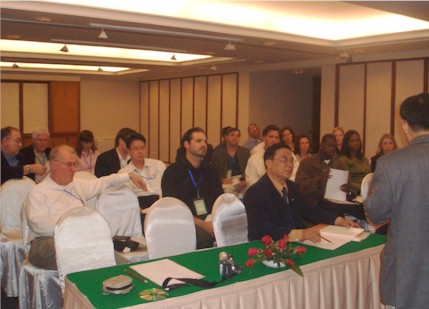 |
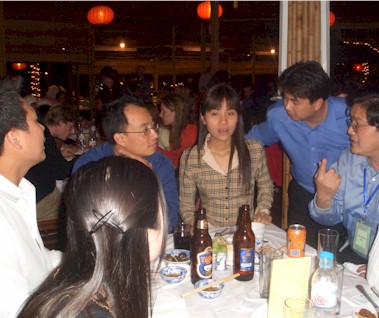 |
| Brifing at the Vietnam Shipping company | A dinner with Hanoi Foreign Language University's business and finance students |
Later the group met with Vietnam Shipping officials to discuss logistics and attended a dinner with business and finance students at Hanoi Foreign Language University where the executives were impressed both with the high level of English and with the enthusiasm and earnest manner with which the local students approached both their studies and their coming business challenges.
The next day the group met with a State Owned Enterprise (SOE) involved in vehicle assembly and automotive spare parts fabrication to discuss how the equalization of these companies is progressing and how State owned companies are dealing with the highly competitive market. The challenges in this area cannot be minimized and most of the group noted that the road ahead for State company’s seems highly problematic. Later the executives met with a government think tank that advises the government on economic structural reform and then received a highly impressive presentation by Madame Chi Lan, Former Vice-President of the Vietnam Chamber of Commerce and Industry (VCCI) and currently an Advisor to the Prime Minister's office in expanding the role of private industry in Vietnam and later with U.S. Embassy officials to discuss recent market development.
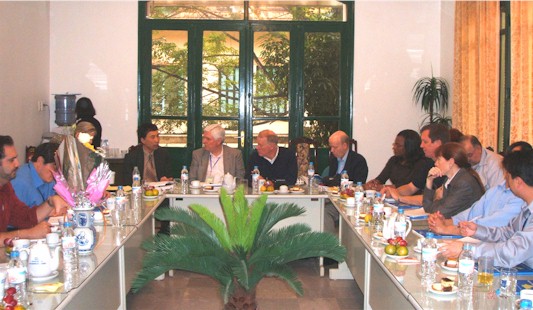
(above) Meeting at the Central Institute of Economic and Management Vietnam (CIEM)
|
|
|
||
|
|
Madame Chi Lan who spoke to the group on International Women’s Day which remains a special occasion in Vietnam impressed the group both with her obvious dedication to business reform and with her obvious intelligence and energy which has helped greatly to further business reform throughout Vietnam. The Embassy officers were also highly appreciated for their presentations in which they noted both the fact that most businesses in Vietnam laud the quality they are able to achieve through the work of their employees in Vietnam as well as some of the continuing challenges in Vietnam such as weaknesses in infrastructure, continued lack of transparency in many areas, corruption and other issues.
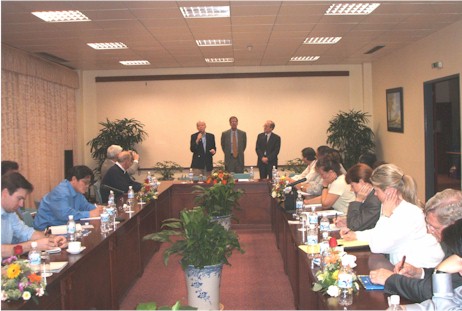 |
|
(above) U.S. Embassy officials briefed delegation on Vietnam business and economic realities.
Just as no visit to China would be complete without a visit in China to the Great Wall, no visit to the North of Vietnam is complete without a visit to Ha Long Bay. Even though the weather didn’t cooperate, all appreciated the chance to view this scenic wonder. That evening the group hosted to dinner the Vietnam-U.S. Freindship Organization at a dinner with U.S. Embassy and other officials including the U.S.-Vietnam Chamber of Commerce (UVCC) to further discuss Vietnam’s current developments and future prospects.
The last day involved work on group projects, a visit to an industrial estate and a final meeting with MBA students at the Hanoi Foreign Language University where the Dean explained to the LMU EMBA students the challenges he faced in expanding the Foreign Language Universities own MBA program. The Dean also described exchange instruction opportunities in teaching various aspects of business that offer particular opportunities for U.S. and other SME managers like those from the U.S.–Vietnam Chamber of Commerce and others willing to spend a week of their year helping students to develop the skills that business requires. Following this fascinating presentation the students then mixed with the MBA students and discussed their studies and future work plans to better appreciate the many facets of Vietnam’s changing society. That night at the close out dinner, students got together for the last time to enjoy sumptuous Vietnamese food served in a very stylish and upscale restaurant owned by two returned MBA students. They also listened and were entertained by various Vietnamese ethnic musicians who demonstrated the diversity and unique nature of Vietnamese folk music.
|
|
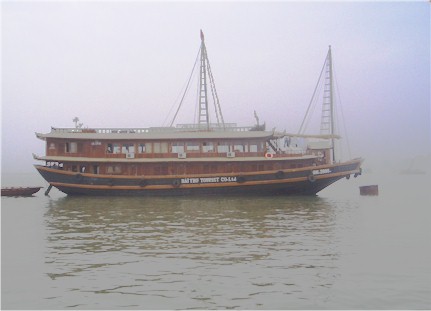 |
|
Dr. Truyen Dang The (standing right), Runckel & Associates' Vietnam Associate and owner of VFD Travel. |
Trip to Ha Long Bay |
In a two-week visit most of the students felt we had managed to expose them to a lot of the changing scene of China and Vietnam. All felt that they had learned a lot but that they had come away from the trip with more questions than they started and more factors to weigh in coming to grips with doing business in Asia. Such is the facts of education and I believed most of the travelers felt the experience was a growing one for them all.
About the Author:
Christopher W. Runckel, a former senior US diplomat who served in many counties in Asia, is a graduate of the University of Oregon and Lewis and Clark Law School. He served as Deputy General Counsel of President Gerald Ford’s Presidential Clemency Board. Mr. Runckel is the principal and founder of Runckel & Associates, a Portland, Oregon based consulting company that assists businesses expand business opportunities in Asia. (www.business-in-asia.com)
Until April of 1999, Mr. Runckel was Minister-Counselor of the US Embassy in Beijing, China. Mr. Runckel lived and worked in Thailand for over six years. He was the first permanently assigned U.S. diplomat to return to Vietnam after the Vietnam War. In 1997, he was awarded the U.S. Department of States highest award for service, the Distinguished Honor Award, for his contribution to improving U.S.-Vietnam relations. Mr. Runckel is one of only two non-Ambassadors to receive this award in the 200-year history of the U.S. diplomatic service.
|
|